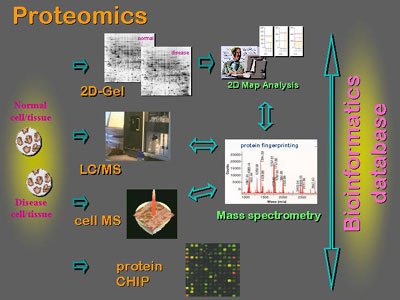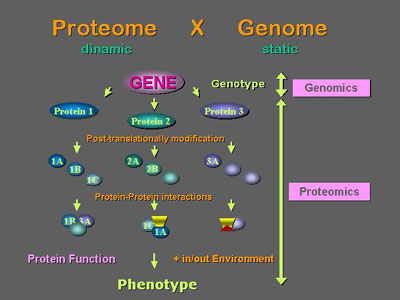
Portuguese Proteomics Network
Rede Proteómica Portuguesa
![]() Home
Home![]() Missions
Missions![]() Network Profle
Network Profle![]() People
People![]() Research Projects of Laboratory Members
Research Projects of Laboratory Members![]() Proteomics
Proteomics![]() 20 Gel Database
20 Gel Database![]() 20 Protocols
20 Protocols![]() DIsCussIon Forum
DIsCussIon Forum![]() News
News![]() Updated
Updated![]() Job Offers
Job Offers![]() LInKs
LInKs![]() Sponsorship
Sponsorship![]() Membership
Membership![]() Contact Us
Contact Us

WHAT IS PROTEOMICS ?
Proteomics is the technology that explores the proteome. The proteome is the total set of proteins expressed in a given cell/tissue or organism at a given time in a certain condition. Proteomics means systematic analysis in an automated, large- scale manner, of all protein expression patterns and protein sequences in cells and or tissues. Proteomics involves the isolation, separation, identification and functional characterization of all of the proteins in a cell/tissue or organism.

WHY PROTEOME RESEARCH?
Genes encode proteins that are the functional molecules in cells. Proteins provide the building blocks for tissues, transmit messages, repair damage and carry out reactions that are essential for life.

There are many more proteins in a proteome than genes in a genome. After transcription from DNA to RNA, the gene transcript (RNA) can be spliced in different ways prior to translation into protein. Following translation, most proteins are chemically changed through post-translational modification, mainly through the addition of carbohydrate and phosphate groups. Proteins interact with each other in the cell. Post-translational modifications and protein-protein interactions play indeed a vital role in modulating the function of many proteins. These dynamic processes have no description at the genomic level.
The proteome complexity is indicated by the following statement: “Even restricted to pair-wise interactions, there are tens of billions of possibilities of functionally significant proteins” (Cantor and Little, 1998).
Abnormalities in protein production or function have been connected to health conditions, environment responses and many diseases. Indeed, nearly most drug targets are proteins – not genes.
To understand how best to control environment responses and or treat a particular disease, it is necessary to identify the proteins associated with that response or disease and to understand how they function.
AIMS OF PROTEOME RESEARCH
• Characterization of the entire proteome (an “atlas approach”) of a cell, tissue or organism by systematic analysis.
• Spatial and temporal characterization of protein expression in a cell/tissue by systematic analysis of individual cell fractions such as nucleus, plasmic membrane, cytoplasmic, etc. and/or individual cell population in a tissue.
• Characterization of protein complexes providing functional identification of protein-protein interactions or DNA/RNA-proteins interactions.
• Quantitative/qualitative study of global changes in proteins expression between treated and non-treated and/or normal and disease, to look for toxic effects/responses or disease markers, respectively.
• Comparative studies: inter-proteome, intra-organism, etc.
There are at least three broad fields for proteomics applications: Biological, pre-clinical and clinical.
BIOLOGICAL
| General Cell Biology Cell/Organism Evolution Gene Function Genetic Regulatory Network Metabolic Pathways Signalling Networks |
PRE-CLINICAL
| Disease Markers & Target Selection Drug Discovery Markers & Targets Validation Drug modes of action Toxicology |
CLINICAL
| Diagnostics & Prognostics Markers of treatment response Therapeutic strategy |